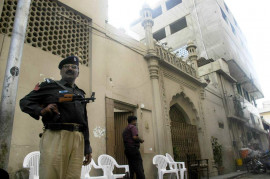
Peculiar isn’t it that a country that regards itself as the first amongst all the free nations of the world took nearly 200 years to acknowledge its second major populace to be equal citizens. Till just 50 years ago, racial segregation in America was so acute that a black American could not study with a white American, could not sit next to a white man in a bus, could not use the same washroom or drink from the same water fountain from where a white man would. Considering that the Americans celebrated their 237th Independence Day this year, 50 years ago seems it took them a really, really long time to get their ethics straightened out!
Ironically though, while the North American media was celebrating 50 years of Martin Luther King’s dream last month, The Toronto Star decided to mark the 25th anniversary of the death of ‘Pakistan’s original radical’, General Ziaul Haq. Tracing our years of shame, the joint feature on the general’s 25th death anniversary was written by Adriana Carranca, The Star’s foreign policy writer and Hamida Ghafour, author of The Sleeping Buddha as a special feature for The Star. The purpose of re-living General Ziaul Haq’s “enduring and toxic” legacy (as phrased in a quote by Abbas Nasir from London) was ambiguous but the full page, close up profile of Zia in regimentals on the cover of the ‘World’ section was unmistakably a rude awakening on the Saturday morning breakfast table!
The first story by Carranca delved into the custom of honour marriages or ‘swara’ — always a juicy subject for Canadian newspapers — while the other story by Ghafour painted a sketchy picture of Pakistan’s recent history starting from Zia’s days before he was elevated to the rank of COAS by his eventual victim — Zulfikar Ali Bhutto (ZAB). Perhaps the intent of Ghafour’s piece was to trace Pakistan’s rise to radicalism, which has led to the present day political black hole. But — like most critics who claim to worship secularism as their political ideal — Ghafour, too, chose only to highlight Zia’s obsession with religion, by default alluding it to be the one and only cause of Pakistan’s current ills.
The political debate on whose fault it was that Pakistan is now beset with so many ills is a very long and arduous argument full of complications and conflicts. Was ZAB responsible by bringing on the wrath of the Western world when he made the Islamic Bomb and organised the Islamic Summit in a bid to hail himself the leader of the Muslim Ummah? Or was it Ziaul Haq whose fanatical disposition and tampering with the Constitution and promulgating the Hudood Ordinances rendered all rotten in the state of Pakistan?
Features in a newspaper written by partial and predisposed authors cannot encapsulate the turn of events over decades that lead to the maturing of a country or even of an individual human being. Pakistan is merely 66 years old, place it in perspective to the over 200 years of the USA and we are nothing but a newborn babe. It took them two centuries to get it right and accept coloured people as equal human beings. And some severe critics disparage even that fact alluding that President Obama represents diversity only because he is meant to represent diversity while racial gaps in household income and household wealth have actually widened.
Pakistan might have plummeted to the lowest level as a sovereign state with its people so downtrodden they don’t even get the luxury to ‘have a dream’. But Pakistan hasn’t even reached its first century mark yet, Hopefully, our past trials will be counted as valuable experience learnt by future leaders who may yet lead us out of the abyss.
Published in The Express Tribune, September 19th, 2013.
Like Opinion & Editorial on Facebook, follow @ETOpEd on Twitter to receive all updates on all our daily pieces.
COMMENTS (5)
Comments are moderated and generally will be posted if they are on-topic and not abusive.
For more information, please see our Comments FAQ











































But Pakistan hasn’t even reached its first century mark yet, It has to change during our time otherwise who cares Jab mar gaye to aye hamaray mazar par Pathar paray sanam taray aisay piyar par
The author has her facts incorrect. America was founded by white immigrants who annihilated the original inhabitants - the Red Indians - during their wars of conquest. The Blacks were brought to the US as slaves. That means the slave owners had every right to do whatever they wanted to do with them as they had paid for them just like an animal. Slavery was more rampant, especially in the South. America fought a Civil war to get rid of slavery and Abraham Lincoln was assassinated because of it. By and large, America is a land of immigrants, and it is a continuous process even today. You cannot draw a parallel between America and Pakistan for the simple fact that Pakistan was created based on an ideology called a homeland for the Muslims of British India. Pakistan and Israel are the only two states in the world that were created on the basis of religion. As per Islam, everyone is equal, but in Pakistan the feudal lords are more equal than others. There are bonded labourers in Pakistan and other deprived classes who are citizens of Pakistan, but have no rights. There are countries that came into existence much after Pakistan and they are doing very well for themselves.
Comparison should have been between countries that came into being about the same time as Pakistan or even later............. that would be an eye opener for Pakistani's.
To correct the author"s misconception, segregation was only the law in the southern states of the defeated confederacy. No such bans on black and white intermixing existed in the majority of American states in the 20th century.
british empire,the greatest empire the world has ever known......practised racial hierarchy as well but it was less formalised ......white colonies canada, australia, largely their own people were treated as first class, other colonies in africa and asia were treated as second class.